|
De Engelse schrijver Julian Barnes werd geboren op 19 januari 1946 in Leicester. Zie ook alle tags voor Julian Barnes op dit blog.
Uit: Alsof het voorbij is (Vertaald door Ronald Vlek)
“Er was onrust, meneer.’
Een explosie van nauwelijks onderdrukt gegniffel; Hunt glimlachte zelf bijna.
‘Zou je dat misschien wat nader kunnen preciseren?’
Marshall knikte traag instemmend, dacht nog iets langer na en besloot dat dit geen moment was voor behoedzaamheid. ‘Ik zou zeggen dat er grote onrust was, meneer.’
‘Finn dan. Ben jij een beetje thuis in die periode?’
De nieuwe jongen zat een rij voor me en links van mij. Hij had geen zichtbare reactie getoond bij Marshalls onnozelheden.
‘Niet echt, meneer, vrees ik. Maar er is een opvatting die inhoudt dat het enige wat er werkelijk over een historische gebeurtenis – zelfs over het uitbreken van de Eerste Wereldoorlog bijvoorbeeld – valt te zeggen is dat er “iets heeft plaatsgevonden”.’
‘O ja, is dat zo? Nou, dan zou ik meteen zonder werk zitten.’ Na wat kruiperig gelach, vergaf Ouwe Joe Hunt ons onze vakantieluiheid en praatte hij ons bij over de polygame koninklijke slager.
In de volgende pauze stapte ik op Finn af. ‘Ik ben Tony Webster.’ Hij keek me wantrouwend aan. ‘Mooi antwoord aan Hunt.’ Hij leek niet te weten waar ik op doelde. ‘Dat er iets had plaatsgevonden.’
‘O dat. Ik was een beetje teleurgesteld dat hij er niet op doorging.’
Dat was niet wat hij geacht werd te zeggen.
Nog een detail dat ik me herinner: wij drieën droegen, als symbool van ons verbond, onze horloges altijd met de wijzerplaat aan de binnenkant van onze pols. Het was natuurlijk aanstellerij, maar misschien iets meer. Het deed de tijd voelen als een persoonlijk, ja zelfs geheim iets. We verwachtten dat het Adrian zou opvallen en dat hij ons voorbeeld zou volgen; maar dat deed hij niet.”
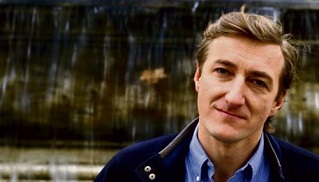
Julian Barnes (Leicester, 19 januari 1946)
De Amerikaanse dichter en schrijver Edgar Allen Poe werd geboren op 19 januari 1809 in Boston. Zie ook alle tags voor Edgar Allen Poe op dit blog
Uit: The Fall of the House of Usher
“The writer spoke of acute bodily illness—of a mental disorder which oppressed him—and of an earnest desire to see me, as his best and indeed his only personal friend, with a view of attempting, by the cheerfulness of my society, some alleviation of his malady. It was the manner in which all this, and much more, was said—it was the apparent heart that went with his request—which allowed me no room for hesitation; and I accordingly obeyed forthwith what I still considered a very singular summons.
Although, as boys, we had been even intimate associates, yet I really knew little of my friend. His reserve had been always excessive and habitual. I was aware, however, that his very ancient family had been noted, time out of mind, for a peculiar sensibility of temperament, displaying itself, through long ages, in many works of exalted art, and manifested, of late, in repeated deeds of munificent yet unobtrusive charity, as well as in a passionate devotion to the intricacies, perhaps even more than to the orthodox and easily recognizable beauties, of musical science. I had learned, too, the very remarkable fact, that the stem of the Usher race, all time-honored as it was, had put forth, at no period, any enduring branch; in other words, that the entire family lay in the direct line of descent, and had always, with very trifling and very temporary variation, so lain. It was this deficiency, I considered, while running over in thought the perfect keeping of the character of the premises with the accredited character of the people, and while speculating upon the possible influence which the one, in the long lapse of centuries, might have exercised upon the other—it was this deficiency, perhaps, of collateral issue, and the consequent undeviating transmission, from sire to son, of the patrimony with the name, which had, at length, so identified the two as to merge the original title of the estate in the quaint and equivocal appellation of the “House of Usher”—an appellation which seemed to include, in the minds of the peasantry who used it, both the family and the family mansion.”
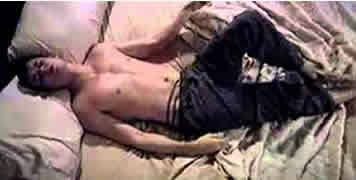
Edgar Allen Poe (19 januari 1809 – 7 oktober 1849)
Austin Nichols als Roderick Usher in de film „The House Of Usher, 2006
De Amerikaanse dichteres en schrijfster Edwidge Danticat werd geboren in Port-au-Prince op Haïti op 19 januari 1969. Zie ook alle tags voor Edwidge Danticat op dit blog.
Uit:Claire of the Sea Light
“The morning Claire Limyè Lanmè Faustin turned seven, a freak wave, measuring between ten and twelve feet high, was seen in the ocean outside of Ville Rose. Claire’s father, Nozias, a fisherman, was one of many who saw it in the distance as he walked toward his sloop. He first heard a low rumbling, like that of distant thunder, then saw a wall of water rise from the depths of the ocean, a giant blue-green tongue, trying, it seemed, to lick a pink sky.
Just as quickly as it had swelled, the wave cracked. Its barrel collapsed, pummeling a cutter called Fifine, sinking it and Caleb, the sole fisherman onboard.
Nozias ran to the edge of the water, wading in to where the tide reached his knees. Lost now was a good friend, whom Nozias had greeted for years as they walked past each other, before dawn, on their way out to sea.
A dozen or so other fishermen were already standing next to Nozias. He looked down the beach at Caleb’s shack, where Caleb’s wife, Fifine—Josephine—had probably returned to bed after seeing him off. Nozias knew from his experience, and could sense it in his bones, that both Caleb and the boat were gone. They might wash up in a day or two, or more likely they never would.
It was a sweltering Saturday morning in the first week of May. Nozias had slept in longer than usual, contemplating the impossible decision he’d always known that he would one day have to make: to whom, finally, to give his daughter.
“Woke up earlier and I would have been there,” he ran back home and tearfully told his little girl.
Claire was still lying on a cot in their single-room shack. The back of her thin nightdress was soaked with sweat. She wrapped her long, molasses-colored arms around Nozias’s neck, just as she had when she was even littler, pressing her nose against his cheek. Some years before, Nozias had told her what had happened on her first day on earth, that giving birth to her, her mother had died. So her birthday was also a day of death, and the freak wave and the dead fisherman proved that it had never ceased to be.“
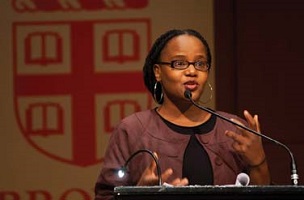
Edwidge Danticat (Port-au-Prince, 19 januari 1969)
De Amerikaanse schrijfster Patricia Highsmith werd geboren als Mary Patricia Plangman in Fort Worth (Texas) op 19 januari 1921. Zie ook alle tags voor Patricia Highsmith op dit blog.
Uit: The Talented Mr. Ripley
“Tom remembered going to a cocktail party at the Schrievers' with Dickie Greenleaf. Maybe the Greenleafs were more friendly with the Schrievers than he was, and that was how it had all come about, because he hadn't seen the Schrievers more than three or four times in his life. And the last time, Tom thought, was the night he had worked out Charley Schriever's income tax for him. Charley was a TV director, and he had been in a complete muddle with his free-lance accounts. Charley had thought he was a genius for having doped out his tax and made it lower than the one Charley had arrived at, and perfectly legitimately lower. Maybe that was what had prompted Charley's recommendation of him to Mr Greenleaf. Judging him from that night, Charley could have told Mr Greenleaf that he was intelligent, level-headed, scrupulously honest, and very willing to do a favour. It was a slight error.
'I don't suppose you know of anybody else close to Richard who might be able to wield a little influence?' Mr Greenleaf asked rather pitifully.

Scene uit de gelijknamige film met Matt Damon en Jude Law, 1999
There was Buddy Lankenau, Tom thought, but he didn't want to wish a chore like this on Buddy. 'I'm afraid I don't,' Tom said, shaking his head. 'Why won't Richard come home?'
'He says he prefers living over there. But his mother's quite ill right now-- Well, those are family problems. I'm sorry to annoy you like this.' He passed a hand in a distraught way over his thin, neatly combed grey hair. 'He says he's painting. There's no harm in that, but he hasn't the talent to be a painter. He's got great talent for boat designing, though, if he'd just put his mind to it.' He looked up as a waiter spoke to him. 'Scotch and soda, please. Dewar's. You're not ready?'
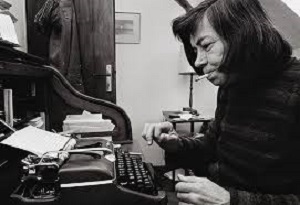
Patricia Highsmith (19 januari 1921 - 4 februari 1995)
De Nederlandse dichteres en schrijfster Marie Koenen werd geboren in ’s-Hertogenbosch op 19 januari 1879. Zie ook alle tags voor Marie Koenen op dit blog.
Uit: De madeliefjes
“De Augustuszon zeeg glanzend rood tusschen gouden wolken weg, achter de bosschen aan de overzijde der Maas. Bij de meidorenhaag van het bloemhofke stond grootvader er naar te zien: en Peterke die op het bankje onder den buksboom zat, keek niet meer naar de tafelsommetjes op z'n lei, maar naar grootvader en hoe de glans om z'n hoofd scheen.
't Was héél stil terwijl ze allebei zoo keken, en daarom schrokken ze, toen het klapdeurtje in de groote hoevepoort openknarste. Zij en Peterke's vader, die den weg opging, zagen elkaar een oogenblik recht in het gezicht, maar tegelijk wendden ze ook alledrie den blik weer af, grootvader treurig naar de zon, Peterke bang naar z'n cijfers, de vader norsch voor zich uit. Hij ging dwars over het gras naar den bergrand, en daar het slingerend paadje af dat uitmondde in den grintweg, die met een breede bocht den heuvel afdaalde naar de herberg. Hij was op z'n zondagsch als een heer, met hoed en boord en das. Peterke vond dat hij er deftig uitzag, en wist hoe blij alle kleine kinderen binnen waren, dat hij maar weer weg was en niet meer schelden kon en klappen uitdeelen. 't Negenjarig Peterke was de oudste van de zeven en zorgde wel uit den klappenregen weg te blijven. Hier in het bloemhofke tusschen de dichte heggen was hij 't allerveiligste, ook omdat grootvader er bijna altijd aan 't harken of aan 't wieden was, aan 't schoffelen of verplanten op het ééne groote bloembed in het midden of op de smalle randperken. Maar nu stond grootvader zoo doodstil bij de haag naar de verte te kijken, zoolang roerloos, dat Peterke nieuwsgierig werd, wat er ginder toch zou te zien zijn. Hij schoof van het bankje op en ging naast hem staan.
Alsof hij met 'n schok wakker werd, keek de oude man Peterke aan, die twee groote tranen langzaam over z'n rimpelig gezicht in z'n baard zag rollen. Z'n oogen waren rood, al was de gloed der avondzon nu ook uitgedoofd. Peterke drong zich tegen grootvader aan, en als zoo dikwijls kwam de groote dorre hand zich over z'n glad kopje leggen, dat er heelemaal in schuil ging.”
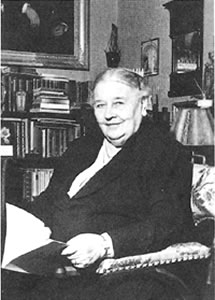
Marie Koenen (19 januari 1879 - 11 juli 1959)
Zie voor nog meer schrijvers van de 19e januari ook mijn blog van 19 januari 2014 deel 1 en eveneens deel 2.
19-01-2015 om 19:18
geschreven door Romenu 
Tags:Julian Barnes, Edgar Allen Poe, Edwidge Danticat, Patricia Highsmith, Marie Koenen, Romenu
|

